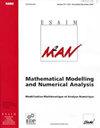流函数公式中含时Navier-Stokes方程的虚元离散化
IF 1.9
3区 数学
Q2 Mathematics
Esaim-Mathematical Modelling and Numerical Analysis-Modelisation Mathematique et Analyse Numerique
Pub Date : 2021-10-03
DOI:10.1051/m2an/2021058
引用次数: 11
摘要
本文提出并分析了一种新的任意阶虚元法(VEM) $k \geq 2$,用于求解流函数形式的时相关Navier-Stokes方程。利用适当的投影算子,利用所提出的与虚拟空间相关的自由度对双线性和三线性项进行离散化。在一定的计算域假设下,推导了误差估计,并证明了该方法在空间和时间变量上都是最优收敛的。最后,为了验证理论分析的正确性,对四个基准算例进行了数值检验。本文章由计算机程序翻译,如有差异,请以英文原文为准。
A virtual element discretization for the time dependent Navier-Stokes equations in stream-function formulation
In this work, a new Virtual Element Method (VEM) of arbitrary order $k \geq 2$ for the time dependent Navier-Stokes equations in stream-function form is proposed and analyzed. Using suitable projection operators, the bilinear and trilinear terms are discretized by only using the proposed degrees of freedom associated with the virtual space. Under certain assumptions on the computational domain, error estimations are derived and shown that the method is optimally convergent in both space and time variables. Finally, to justify the theoretical analysis, four benchmark examples are examined numerically.
求助全文
通过发布文献求助,成功后即可免费获取论文全文。
去求助
来源期刊

CiteScore
2.70
自引率
5.30%
发文量
27
审稿时长
6-12 weeks
期刊介绍:
M2AN publishes original research papers of high scientific quality in two areas: Mathematical Modelling, and Numerical Analysis. Mathematical Modelling comprises the development and study of a mathematical formulation of a problem. Numerical Analysis comprises the formulation and study of a numerical approximation or solution approach to a mathematically formulated problem.
Papers should be of interest to researchers and practitioners that value both rigorous theoretical analysis and solid evidence of computational relevance.
 求助内容:
求助内容: 应助结果提醒方式:
应助结果提醒方式:


